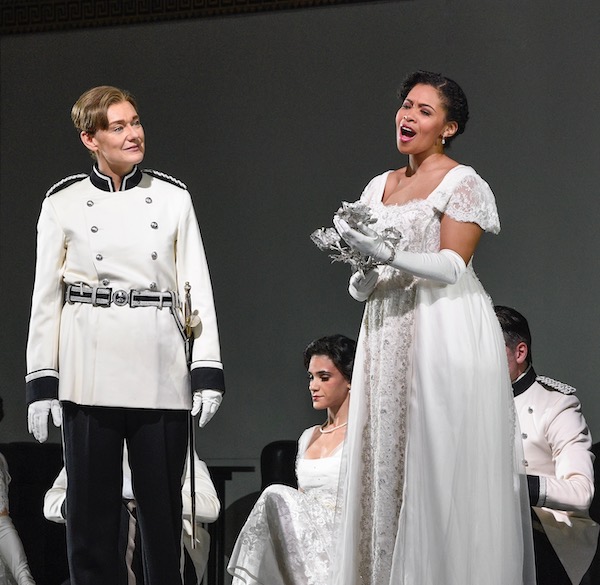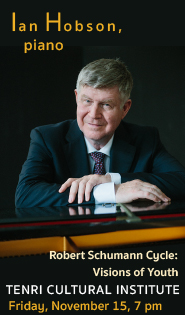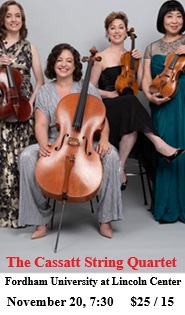Met’s satisfying “Rosenkavalier” reboot is more than the sum of its parts

Der Rosenkavalier is a difficult piece to resist. The lushest of Richard Strauss’s operas, this score combines the musical imagination of darker works like the almost contemporaneous Elektra with the sonic richness that defines his orchestral style. The result is a piece that both challenges the listener and enchants with its rapturous sonic beauty.
That musical richness, as well as the bittersweet comedy of the libretto, shone through in the Metropolitan Opera’s season premiere Friday night, even as the execution showed plenty of flaws. Somehow, Friday’s performance was more than the sum of its parts, combining for a deeply satisfying evening of complex musical comedy.
Czech mezzo-soprano Magdalena Kožená led a fine cast as Octavian. The lively fire in her voice captured the romantic fervor of the hot-headed young count, with a tautness and firm focus in her middle range that brightened into a sunny top
Her portrayal, though, did not feel natural: she showed very little chemistry with the Marschallin, and it’s hard to build the arc of Octavian’s romances if that first relationship feels anything less than red-hot. Kožená wasn’t helped by the fact that her costumes were so ill- tailored, hanging loosely off of her and making the teenage count look overly childish.
For her part, Camilla Nylund effectively played the more mature partner in the relationship, showing a regal bearing in her company debut as the Marschallin. The chaos of Act III froze when she entered in an enormous, black, fur-trimmed coat, exuding glamour and dignity. Vocally, she had moments of focus and clarity, but on the whole her soprano tended to spread and didn’t always stay on true pitch. She lacked the soft warmth that is so crucial in the Marschallin’s solitary moments, the inward reflections that let the audience feel her quiet sadness.
Golda Schultz gave an enchanting performance as Sophie, approaching her character with a warm earnestness of spirit. This was a nuanced portrayal, with an inner confidence to stand up to the domineering men around her but also a vulnerability in her own romantic feelings for Octavian. Her light, lively soprano showed a slightly dark sweetness like burnt caramel, with a gorgeous, misty quality to her soft singing.
Stealing the show was Austrian bass Günther Groissböck, reprising his revelatory interpretation of Baron Ochs. No tubby old lech, this Ochs is a muscular bully, inspiring the loyalty of his men with brutish charisma. Groissböck strikes a perfect balance in his portrayal, conveying enough oafishness to keep the role’s comedic side alive while also feeling utterly repulsive, his casual viciousness coming across as uncomfortably real. His vocal performance was inseparable from his character, with a warmly resonant, viscous bass that showed a touch of gravel to mirror the baron’s underlying roughness.
Markus Eiche made an excellent debut as Herr von Faninal, Sophie’s overbearing father, with a powerful, granite baritone. Also making her company bow was Alexandra LoBianco, who showed off a full, lively mezzo-soprano as Marianne Leitmetzerin.
Thomas Ebenstein, yet another debutant, and Katharine Goeldner made a deliciously slippery pair as Valzacchi and Annina. Matthew Polenzani made a hammy cameo as the Italian singer, strutting around in a Caruso costume; his tenor sounded a little tighter than usual, but still managing a suave ease of expression in his singing.
The most famous name on the program for this run is Sir Simon Rattle, the English conductor who led the legendary Berlin Philharmonic for more than 15 years.
For a maestro of his stature, Rattle—who is married to Kožená—led a surprisingly sloppy performance, at least for the first act; he struggled to corral the orchestra from the start, and fell into an otherwise cursory reading.
He was at his best in quieter moments, achieving a soft shimmer during the presentation of the rose. As the night wore on, Rattle dug deeper into the music’s details, highlighting individual gestures that lent dramatic color. Yet he never demonstrated a feel for the flesh of this complex, richly constructed score.
The Robert Carsen production that debuted in 2017 has maybe lost a step in its first revival, but it is still an eminently lively rendition of an opera that can feel drawn out in a by-the-book staging. Placing the action on the eve of the First World War lends the scenario a special poignancy, as the observer knows that, as surely as the Marschallin feels her youth slipping away, the entire world that these characters belong to is about to evaporate.
Brigitte Reiffenstuel’s vivid costumes are crucial in establishing the scene, conveying a wealth of information about their characters. Act III is a particular triumph—placing it explicitly in a brothel allows Carsen to go all-out on the raucousness of the scene, turning what is often a sleepy act into unbridled hilarity.
Der Rosenkavalier runs through January 4 at the Metropolitan Opera. The December 28 performance will be led by Gareth Morrell, featuring Katie Van Kooten as the Marschallin and Angela Brower as Octavian. Alok Kumar appears as the Italian Singer on December 23. metopera.org


